Every year, several companies— most notoriously Google— float various unfunny, excessively long dad jokes on April Fools Day. But rather than waste your time detailing these latest flat attempts at humor in tech, why not take a moment on April 1 to take a look at the really foolish stuff the tech media serves up virtually every day?
Fake, phony and foolish
Sometimes journalists and bloggers print things they apparently know to be false just to generate sensational clicks. This is usually obvious because after the alarming headline that states something outrageous, upsetting or otherwise provocatively in conflict with reality in order to get a click, they then begin walking back the entire premise.
By the end of the piece, they generally just go ahead and admit that the entire story was nonsense. For example, note the recent rash of clickbait that claimed, then un-claimed, that an Apple executive had announced that it will stop selling music downloads.
That sort of fake news often only works with Apple. If anyone were to report that Samsung or Microsoft or some other company was about to stop selling music downloads, we'd just assume that it was because they'd failed in yet another attempt to copy Apple. Stories about Milk Music or Zune Marketplace don't drive clicks because there's no potential for driving fear or outrage. Nobody cares.
For Apple, it's different. In order to fully maximize the clickbait intensity of a false story about iTunes downloads, it was reported specifically as being a dick move by the company to take away something everyone loves, rather than just an inevitability of the trend toward streaming.
Sometimes it's hard to tell whether false reporting is intentionally a malicious hit piece or simply a lazy, ignorant effort to deliver a moment of content capable of attracting eyeballs toward a stream of advertising.
The end result is the same: yet another narrative on why the world's most successful company is secretly a bumbling bunch of idiots perched precariously on the brink of failure.
Such a fool premise requires really foolish logic to back it up. You might call it flawgic. Here are three examples of super foolish ideas that the worst tech media writers can't stop spreading.
April Fools: iPad is failing as Chromebooks take off in education
This narrative started a few years ago but recently found a sounding board in the coverage of Apple's recent education event. Bloomberg didn't know anything about what Apple would actually be announcing, so it instead wrote a scoop that detailed how badly iPad was performing in a market dominated by Chromebooks.
There are a few factual problems here: despite claiming that hardware deployed in K-12 education changes the future of what kids will buy as adults and use in the workplace (an idea that has never been true, just ask Acorn in the U.K.), the reality is that education is not very big nor very valuable commercially.
At its most beleaguered point back in the 1990s, Apple controlled a huge proportion of the hardware sales in education, but it didn't help the company drive Mac sales in the enterprise. Absolutely nobody reported Apple's clear edge in education back then as an inevitable coup about to dethrone Microsoft globally in PC sales. That would have been stupid to suggest in 1998. Yet that's exactly what virtually every member of the media is foolishly repeating in 2018, just in reverse.
Last year, Apple sold nearly 44 million iPads globally, less than 2 million of which were sold to U.S. K-12 education. Google's partners shipped nearly 7.5 million Chromebooks into U.S. K-12, but that also accounted for virtually all of the Chromebooks produced globally. Apple has a huge, growing iPad business with its foot planted in education; Google has a small, stagnant Chromebook base entirely confined inside K-12.
Apple doesn't always invest in pure proportion to its potential Return On Investment. Apple focused its 2018 iPad launch event almost entirely upon K-12 education, with features and specialized software and services targeted specifically to that segment, despite the fact that U.S. K-12 represents less than 5 percent of Apple's iPad business. Apple can afford to invest in education because it earned over $19 billion from iPad sales in just the last year.
In stark contrast, Chromebook hardware sales earned nothing for Google. Even if we assume that every school paid for support contracts, Google's total revenue from Chromebook was in the low millions. Yet Google has to pay for the same type of software development, maintenance and support costs as Apple.Sales volumes don't matter unless they are driving sustainable profits
Sales volumes don't matter unless they are driving sustainable profits. The investments Apple makes in education are also being adapted to serve the enterprise, where Apple already makes billions and where there is a clear and significant demand for iPad as a product.
For Google, the reverse is true. It tried valiantly to sell Chromebooks to the enterprise and failed. There is no latent demand for low-end, cheap netbooks that can only run web apps. Yet if you ignore global reality and focus only on a tiny, insignificant part of the picture, you can create the illusion that Google is winning and Apple is at the corner of Existential Crisis and Doom.
If you examine the facts, it's clear that the narrative that Chromebooks are doing really well is totally foolish. Yet members of the media are either crafting a story they know is false, or are so ignorant of the facts that they come away honestly believing the story that nickels are larger than dimes, and therefore must be worth more regardless of the number on the coin.
Google has settled upon education as a runner-up business model for Chromebooks because no other segment is really buying them: not enterprise and not consumer. That business is not only unsustainable for Google, it's also unprofitable for the Chromebook makers who also once built netbooks, Android tablets and Android Wear watches. That's a pretty obvious pattern: lots of shipments (or lots of announcements) are no substitute for sustainable profitability.
A good way to determine if a media narrative is true or just manufactured foolishness is to imagine if the same story would be told if things were different and the story flattered Apple. That's easy to do here because Apple once owned education while its primary competitor, Windows PCs, took over virtually everything else. Nobody hid facts to paint a glorious, flattering portrayal of Macs in education as evidence that PCs were doomed. That would be really foolish, just a foolish as the Chromebook narrative today.
April Fools: Siri is failing next to the breakout success of Alexa, Assistant and maybe Cortana
A similar media narrative regarding Siri has identically served as a way to denigrate Apple while creating a lush portrait of success for a competitor making nearly nothing on relatively small volumes of low-end hardware.
Just as with Google's Chromebooks in U.S. K-12 education, this foolish media narrative greatly exaggerates the market importance and value of Amazon's Alexa voice assistant as it also suggests Apple's ability to sell hardware is at risk because the company isn't pursuing the same voice-first strategy Amazon was forced into after its Fire Phone burned down.
There's even the side-suggestion that Google Assistant and Microsoft Cortana are also commercially outperforming Apple's Siri just because they can answer some questions better, again without regard to the numbers of people actually asking, or even the actual value of a voice-based answer. Numbers matter. Journalists should be asking for them, not just expressing their agreement that nickels are indeed impressively large.
Note that the issue here is not that Siri is beyond criticism. In many cases, Siri simply does not perform well. Many its competitors can do things Siri fails at. Both of those things are true. However, the truth doesn't make everything else it touches also true.
If consumers actually cared much about voice services, Google's Pixel phones that premiered with exclusive Assistant features should have at least made a dent. They didn't. Both generations have been huge commercial flops despite Google's massive attempts at advertising and all of the endorsement and publicity that The Verge and other media outlets could provide for them.
Siri once inarguably helped Apple to sell iPhone 4s, a model that (apart from Siri) wasn't radically different than its predecessor. But it isn't 2011 anymore, and the novelty of voice assistants aren't still moving billions in hardware sales.
Cortana did next to nothing to boost PC sales or Windows Mobile; Google's Assistant hasn't mattered and even Alexa (despite all of its glowing media coverage and a generally positive reception from consumers) doesn't really matter in terms of money— the currency of the ability to do things. At best, Alexa is an effort to get people to place more online orders from Amazon.
At the same time (and despite a detailed media catalog of all of its flaws) Siri is supporting real-world functionality to Apple's offerings ranging from Apple TV to AirPods to CarPlay to HomePod, and it helps support Apple's leadership in accessibility. Siri needs to be improved, but there's zero evidence that its flaws are fueling any significant shift in anything apart from some low-value announcements of support for Alexa for washing machines and other totally foolish nonsense.
Again, imagine how tech media would handle the same subject in reverse, if say Apple launched a competing service years after another company, yet instead of just using it to sell low volumes of profitless hardware (like Amazon), that service helped launched a series of highly successful, profitable businesses that the original company itself had never capitalized upon, even though the original service was generally thought of as being superior, despite not making any money.
Yet Apple's service subscriptions (I'm talking, of course, about Apple Music) are rapidly growing in scale toward the level of Spotify's paid subscriptions at a pace massively faster than Alexa's adoption compared to Siri. Nobody regularly reports that Apple Music is killing Spotify. Instead, they're reporting that perhaps Spotify will enter the hardware game and offer a challenge to Apple. That's pretty foolish. And it's the opposite treatment Alexa gets as a Siri competitor.
April Fools: MacBook Pros are hopelessly behind the genius engineering of Microsoft Surface
Have you heard? Microsoft has run circles around Apple in its ability to innovate, shipping (among other concepts) laptops that convert into a serviceable, if impractical, tablet screen; a big screen that you can draw on; a notebook with a GPU base; keyboards with a fabric top and so many other novel ideas.
The media narrative states that Microsoft is exciting and cool again, while Apple just makes basic rectangles that lack legacy ports and present an expensive OLED Touch Bar as a dynamic part of the keyboard just to make the thing look really cool.
Who's to say what the value of a specific innovation is? Well the dollar talks. It says that despite all of its creative ideas, Microsoft's Surface isn't racking up many votes from consumers or businesses (who were supposed to be a shoo-in for Microsoft).
Across all the years that Microsoft has been spending billions to develop and market Surface, it has been a marginal failure and has never grown past quarterly sales of a little more than a million units from just over a billion in revenues.
Across its last fiscal year, Apple sold 19.25 million Macs (worth $25.85 billion in revenues) and 43.75 million iPads ($19.22 billion). That means that outside of phones, Apple's vision for computing devices brought in $47 billion. Microsoft's tablet, laptop and other PC form factors combined were less than a tenth of that. And while Apple's sales are trending toward growth, Microsoft's Surface unit sales are actually slowing— in the last winter quarter, Microsoft defended its stagnant Surface unit sales by pointing out that it sold a slightly more expensive mix of products.
Journalists keep lapping this up and regurgitating it, but the reality is that despite all the puff pieces hailing its innovations, Surface is a stagnant failure of a business. And despite all the contemptuous dismissal of Apple's work by tech journalists who prefer nickels to dimes, its light, thin, legacy-free MacBooks with the distinctive novelty of the Touch Bar are selling in high volume and making lots of money— despite intense competition from iPad Pro— Apple's other highly innovative computing platform.
For nearly a decade, Apple has been developing and maintaining the two most desirable, commercially successful and flagrantly-copied visions for the future of computing. But yeah, tell us more about the incredible innovation at Microsoft driving the failed hardware business of the company that lost its monopoly over computing (and any presence at all in smartphones) by being boring and moving too slow.
Imagine how Apple's "innovation" would be reported if it were coming up with lots of new ideas that were only perpetuating stagnant, immaterial sales that were far below the leaders of the market. Back in the 1990s, this was actually happening to the Beleaguered Apple, and nobody was inventing media narratives to explain why Apple was really performing well and that the low innovation PC makers were doomed.
We also don't need to imagine today: the media narrative invented for iPhone X is that its sales are disappointing because nobody cares about its fancy premium priced features.
That's a straight-up lie. We know iPhone X drove Apple's phone sales pace higher while also dramatically increasing the Average Selling Price of iPhones. And on top of that, Apple sells— by far— the most premium phones, not just overall but in markets ranging from China to India— places where supposedly nobody can afford Apple's prices.
What foolishness. These media narratives (and I could keep going, but April 1 is already here) in tech are more laughable than the dumb jokes tech companies are creating for the media.
 Daniel Eran Dilger
Daniel Eran Dilger








-m.jpg)






 Charles Martin
Charles Martin
 Christine McKee
Christine McKee
 Wesley Hilliard
Wesley Hilliard
 Malcolm Owen
Malcolm Owen
 Andrew Orr
Andrew Orr
 William Gallagher
William Gallagher
 Sponsored Content
Sponsored Content


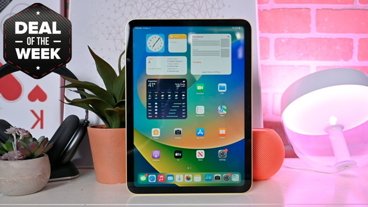





64 Comments
"April Fools" then continues to post links to his own previous articles. DED, you need to relax a little and stop being so defensive on everything.
As always a very good article. I hav not agreed with all of your articles, but I have always enjoyed your writing. Thank you.
Agreed with all the points.
The thing about telling a lie, is to have enough truth to make it believable.
1) Chromebooks are not succeeding generally and IMO will go the way of Netbooks. But they have gotten a foothold in education. This is more to do with the fact that they look like a bargain to school administrators
2) Siri isn't as useful as is should be. But while others may do some things better, the truth is most people don't want to talk to their computer. Honestly whether the system is running Cortana, Google, Alexa, or Siri, I know of no one that uses voice as their first option. Siri may be falling behind, but none of them are really powerful enough to do what I want.
3) The Surface isn't winning many friends. But the TouchBar won't really break out until it's on more than a small number of models. Until I can get a MagicKeyboard III with a TouchBar for my iMac, or as an add on for my iPadPro they remain a fantasy. Until they become a reality for the majority of Mac users I suspect most software companies won't include TouchBar functionality.